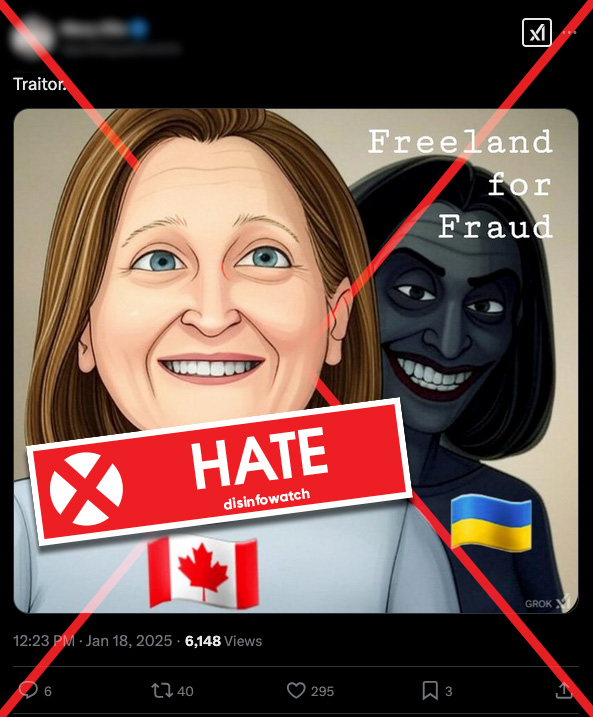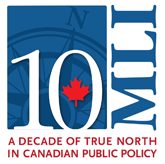
This meme is an example of Russian-aligned disinformation and psychological manipulation aimed at inciting hatred towards Ukrainians and Canadians of Ukrainian heritage, particularly targeting former Deputy Prime Minister and Liberal Party of Canada leadership candidate, Chrystia Freeland. T
The Claim:
The meme visually and textually suggests that Chrystia Freeland is a “fraud” and a “traitor,” with an underlying implication that she is deceitfully serving Ukrainian interests over Canada’s. The sinister, shadowy figure behind her—depicted as dark-skinned and grinning maliciously—implies an external or hidden influence manipulating her.
The inclusion of both the Canadian and Ukrainian flags reinforces the false narrative that Canadian officials of Ukrainian heritage are disloyal to Canada and act on behalf of a “foreign agenda.”
The Facts:
- Freeland’s Ukrainian heritage has been a long-standing target of Russian propaganda, which frequently smears her as part of a “Ukrainian nationalist” plot.
- There is no evidence of fraud or treason by Freeland. These accusations are part of a wider Kremlin-backed disinformation campaign that portrays Canadian support for Ukraine as illegitimate or corrupt.
- Russia’s long-standing strategy includes attempting to discredit Western leaders who support Ukraine by associating them with conspiracies, Nazism, or financial misconduct.
- The racist and fear-mongering imagery—using a darkened figure in the background—mimics longstanding anti-Semitic and xenophobic tropes where a hidden force is depicted as controlling political figures.
- The phrase “Freeland for Fraud” plays into disinformation narratives about Western aid to Ukraine being misused, a false claim often pushed by Russian propaganda to undermine Western support for Kyiv.
Narrative Context:
Delegitimizing Canadian Support for Ukraine:
By depicting Freeland as corrupt or deceitful, Russian propaganda aims to undermine public confidence in the Canadian government’s support for Ukraine. This narrative feeds into a broader Kremlin disinformation strategy that portrays Western governments as puppets of foreign influence, reinforcing the false notion that backing Ukraine is not in Canada’s national interest.
Stoking Anti-Ukrainian Sentiment in Canada:
The Kremlin has long sought to divide Canadians and their Ukrainian-Canadian communities, framing them as “foreign agents” or “fascist sympathizers.” This tactic echoes Soviet-era disinformation campaigns that aimed to discredit Ukrainian diaspora groups by painting them as extremists, a strategy designed to marginalize and delegitimize their voices.
Amplifying Far-Right and Conspiratorial Rhetoric:
The image employs tactics reminiscent of QAnon-style conspiracy theories, portraying politicians as puppets of hidden forces. The racialized imagery further draws on far-right tropes about global elites manipulating politics, reinforcing broader Russian influence strategies designed to deepen societal divisions in the West.
This meme is not simply political criticism—it is a calculated propaganda effort that fuses anti-Ukrainian sentiment, conspiracy theories, and far-right disinformation. It follows a familiar Kremlin playbook of attacking diaspora communities, demonizing Western support for Ukraine, and framing political opponents as traitors.

